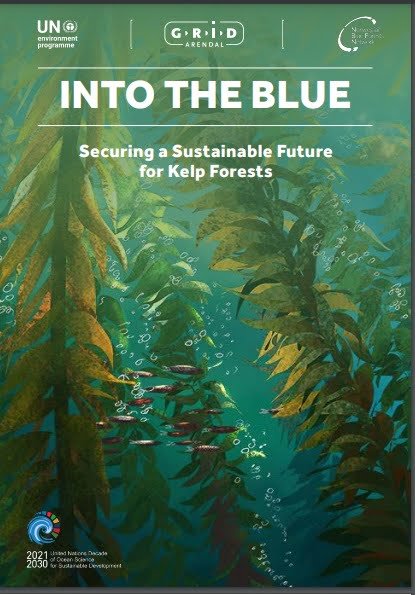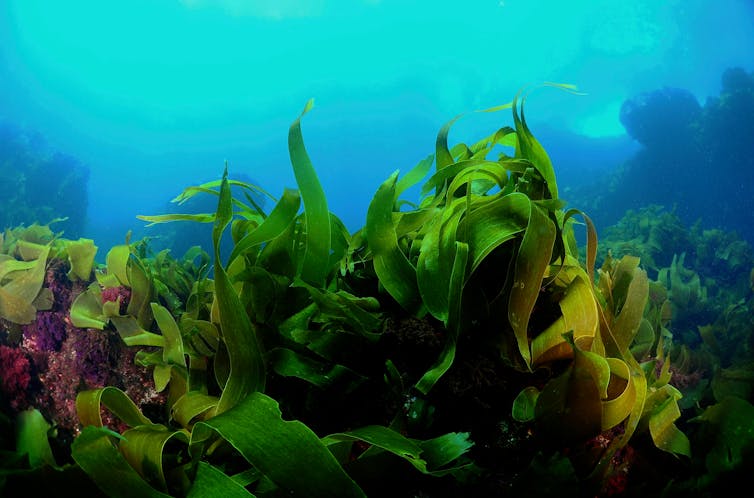
by The University of Western Australia
Marine ecologists and an environmental law specialist from The University of Western Australia are lead contributors to the most comprehensive review undertaken on the state of the world’s kelp forests.
“It provides a range of policy and management interventions and options that can be used to maintain these remarkable ecosystems into the future” said Dr Karen Filbee-Dexter.
Professor Thomas Wernberg, Senior Research Fellow Dr Karen Filbee-Dexter and PhD candidate Jurgen Valckenaere from UWA’s School of Biological Sciences and Oceans Institute, and Professor Erika Techera from the UWA Law School, contributed to the United Nation’s Environment Program report “Into the Blue: Securing a Sustainable Future for Kelp Forests” as coordinating authors and editor.
The report incorporates the expertise of more than 200 experts from 15 countries, spanning ecology, management, law, finance and policy.
Contributing editor Dr Filbee-Dexter said the report, an official document of the UN Decade of Ocean Science for Sustainable Development, is intended to prompt global action towards protecting vital kelp habitats.
“The report not only reveals the state of science on the world’s kelp forests but also provides recommended actions to protect and sustainably manage them,” she said.
“It provides a range of policy and management interventions and options that can be used to maintain these remarkable ecosystems into the future and to support the people and economies that have depended on them for generations.”
Professor Wernberg said kelp forests, which cover a third of the world’s coastlines, are one of the most widespread and valuable marine ecosystems on the planet, providing a range of important ecological, economic and cultural benefits.
“They help draw carbon from the atmosphere, produce oxygen, reduce damage from storms, improve water quality and attract tourists to their rich biodiversity,” Professor Wernberg said.
Stay Always Informed
Join our communities to instantly receive the most important news, reports, and analysis from the aquaculture industry.
“Kelp and seaweed farming has become the fastest-growing aquaculture industry globally, with an increase of 6.2 per cent per year over the past two decades.
“However, kelp forests across every continent are in decline, and over the past 50 years, 40–60 per cent of kelp forests have been degraded. A multitude of local pressures and climate change are threatening the survival of this vital ecosystem.”
PhD candidate Mr Valckenaere said kelp forests could help countries achieve several global goals in terms of climate, biodiversity and sustainable development, however despite their importance, have received little attention in ocean governance.
“To date, no global legal or policy instruments have focused explicitly on kelp,” he said.
“Additionally, many international frameworks, national laws and policies, and local and traditional knowledge could be considered, engaged and channelled for the successful management, protection, and conservation of crucial kelp forests.”
Reference (open access)
United Nations Environment Programme, & Norwegian Blue Forests Network (2023). Into the Blue: Securing a Sustainable Future for Kelp Forests. https://wedocs.unep.org/20.500.11822/42255.
Editor at the digital magazine AquaHoy. He holds a degree in Aquaculture Biology from the National University of Santa (UNS) and a Master’s degree in Science and Innovation Management from the Polytechnic University of Valencia, with postgraduate diplomas in Business Innovation and Innovation Management. He possesses extensive experience in the aquaculture and fisheries sector, having led the Fisheries Innovation Unit of the National Program for Innovation in Fisheries and Aquaculture (PNIPA). He has served as a senior consultant in technology watch, an innovation project formulator and advisor, and a lecturer at UNS. He is a member of the Peruvian College of Biologists and was recognized by the World Aquaculture Society (WAS) in 2016 for his contribution to aquaculture.







